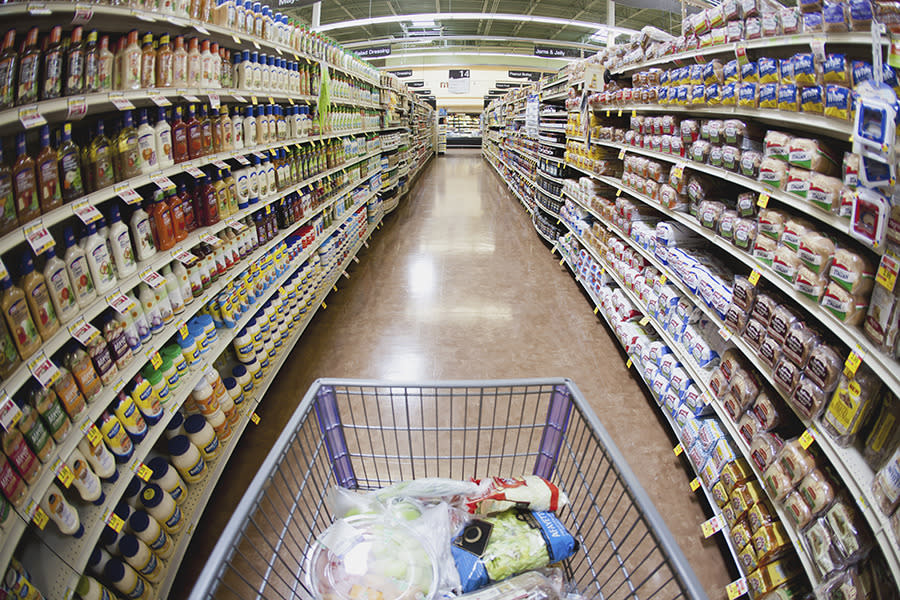Corporations are Promising to Share GMO Information, But Is It Enough?

Are you willing to scan all the items in your grocery cart to get info? (Getty Images)
More than 30 major companies have joined a new initiative to provide consumers with detailed information about their products.
The initiative, called SmartLabel, involves a QR code that, when scanned, will give consumers information about product ingredients, allergens, animal welfare, environmental policies, and whether the foods contain genetically modified organisms (GMOs).
According to the Grocery Manufacturers Association, which spearheaded the initiative, some companies are beginning to roll out products with SmartLabel this year and in early 2017.
The information featured in SmartLabel will also be available online, so people who aren’t fans of using QR codes can access the information from a computer.
Here are the companies that have already signed on:
ConAgra Foods
Hormel Foods
Campbell Soup Company
Knouse Foods
Land O’Lakes
PepsiCo
Coca-Cola
Nestle
Hershey
J.M. Smucker Company
Kellogg Company
General Mills
McCormick & Company
Bimbo Bakeries USA,
Wakefern Food Corp
Bruce Foods Corporation,
Bumble Bee Seafoods
Ferraro USA
Flowers Foods
Reily Foods Company
Rich Products Corporation
Sunny Delight Beverages Co.,
Tyson Foods, Inc.
Ahold USA
Topco LLC
The WhiteWave Foods Company
Pharmavite LLC
Clorox
Colgate-Palmolive
Procter & Gamble
Unilever
“It’s definitely a step in the right direction,” Charlie Arnot, CEO of The Center for Food Integrity, tells Yahoo Health. “We know consumers are increasingly interested in greater transparency in food.”
Arnot says the QR code is a good way to present all of the information consumers are seeking about their products in one place, since it all wouldn’t fit on the actual product label. However, he says, he doesn’t expect that it will be the only factor people use when deciding whether a product meets their expectations, since consumers already often talk to friends and do independent online searches to form an opinion about a product.
Sheldon Krimsky, PhD, a professor at Tufts University and chairman of the Council for Responsible Genetics, tells Yahoo Health that the initiative is a great idea in theory, but he has some concerns.
“Who is going to oversee whether or not this kind of labeling is true?” he says. “Unless there is some accountability for evaluating the validity of it, I don’t know how useful it’s going to be.”
Roger Lowe, a spokesman for the Grocery Manufacturers Association, tells Yahoo Health that the product information is provided by the manufacturer. “It’s important to know that all information on a SmartLabel landing page is bound by the same accuracy requirements as if it were printed on a label,” he says. “The truthfulness and accuracy of claims are subject to review by the U.S. Department of Agriculture, Food and Drug Administration, and Federal Trade Commission.”
Related: Craving a Post Workout Beer? You’re Not Alone
Krimsky also points out that there is often a gray area in what constitutes a GMO: “What about if the animals have been fed genetically-modified corn and their products are used in food? Would it say no GMOs or GMOs?”
Both experts say they’re not sure how many people will actually use the QR code aspect of SmartLabel, since there are plenty of people who don’t use the technology — and there’s still a segment of the population without a smartphone.
While Arnot thinks that people who place a high value on the information offered in SmartLabel will make an effort to use it, he points out that there’s also a mental benefit to people who don’t use it. “Research has shown the people feel better knowing information is available, even if they don’t decide to access it,” he says.
The Grocery Manufacturers Association estimates that nearly 30,000 products will contain SmartLabel by the end of 2017 and, within five years, more than 80 percent of the food, drinks, pet products, personal care items, and household goods we buy will use the labeling.
Read This Next: Kind Bars Asks the FDA to Redefine ‘Healthy’
Let’s keep in touch! Follow Yahoo Health on Facebook, Twitter, Instagram, and Pinterest.

